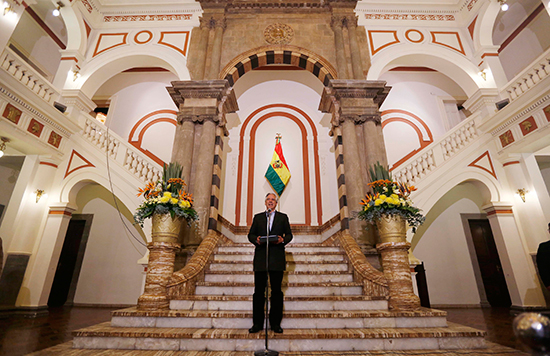Bogotá, June 16, 2016 – Enraged over press coverage of a government influence-peddling scandal that helped crush President Evo Morales’s reelection hopes, high-ranking Bolivian officials are lashing out at the country’s independent media and demanding that journalists be sent to prison.
In a speech Wednesday, Vice President Álvaro García Linera said that several news outlets had lied to the country and defamed Morales ahead of a February referendum in which voters narrowly rejected a constitutional amendment that would have allowed Morales to run for a fourth consecutive term.
“These unsubstantiated accusations and threats against Bolivian media are clearly aimed to curb critical reporting on sensitive topics,” said CPJ Americas Senior Program Coordinator Carlos Lauría, from New York. “We call on Bolivian authorities to abstain from threatening journalists for their reporting and allow the media to work without interference.”
The vice president also took journalists to task for articles investigating whether a child born to Morales and Gabriela Zapata, his former romantic partner who stands accused of influence-peddling, was still alive.
“Those responsible will have to go to jail,” García Linera said. “The law will be applied to all of these liars.”
García Linera singled out the independent Página Siete, Los Tiempos, and El Deber newspapers, the Erbol radio network, and the Catholic church-run Fides News Agency. He said they were part of a “political-media mafia” that had carried out “ruthless attacks” against Morales.
His speech followed declarations last month by Presidential Minister Juan Ramón Quintana, who called those same news outlets a “cartel of liars” whose true aim was to block the left-wing government’s economic and political reforms.
Following Quintana’s remarks, Carlos Valverde, a television journalist who has closely covered the scandal, fled to Argentina and then to Brazil, according to news reports. Another Bolivian journalist, Wilson García Mérida, editor of the Sol de Pando newspaper, fled to Brazil last month after he said Quintana had accused him of sedition, according to news reports.
The scandal erupted in January when Bolivian news outlets reported that a Chinese company that employed Zapata had improperly won government contracts worth half a billion dollars. The Morales government denied any wrongdoing but then abruptly arrested Zapata and charged her with influence-peddling. Zapata, speaking to reporters from jail in March 2016, contradicted Morales’s claims that a baby she and the president had together had died in infancy, saying the baby was still alive. Later, Zapata reversed herself and said that the baby had died in 2009.
CPJ’s requests for comment from the ministries of communication and the presidency were not immediately returned.
